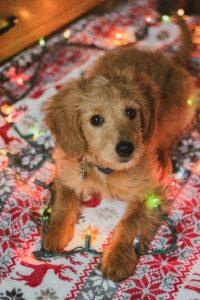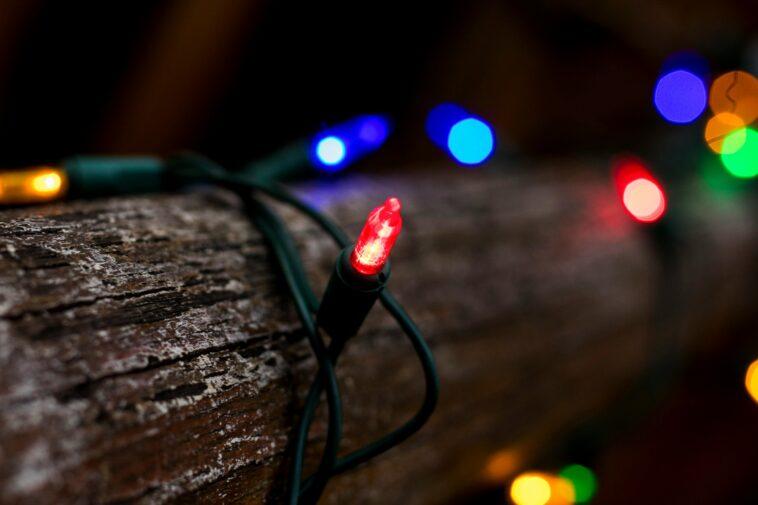As the holiday season approaches, many Florida residents are busy decorating their homes with lights, ornaments, and festive displays. While these decorations bring cheer and joy, they also come with hidden dangers—especially for pet owners. Florida personal injury attorneys at Fasig Brooks are raising concerns about the electrical hazards posed by holiday lights, particularly for dogs and other curious pets. With pets naturally drawn to cords, lights, and ornaments, the risk of accidents involving electrical shocks, fires, and other dangers increases.
The Hidden Risks of Holiday Lights for Pets
Electrical defects in holiday decorations, such as faulty wiring, frayed cords, or poorly made lights, can create fire hazards. Pets, especially dogs, are prone to chewing on cords, which can result in dangerous electric shocks or even choking. As a result, pet owners need to take extra precautions when setting up their holiday decorations to keep their furry companions safe.
According to the team at Fasig Brooks, hidden electrical defects caused by poor materials, manufacturing flaws, or general wear and tear can lead to overheating, sparks, or electrical arcing. Unfortunately, many of these risks are more common in cheaper or counterfeit products that do not meet safety standards. Consumers are particularly vulnerable when buying lights from unverified online sellers, where counterfeit decorations can bypass crucial safety regulations.

How to Protect Your Pets and Avoid Electrical Hazards
To help Florida residents keep their homes safe this holiday season, experts at Fasig Brooks recommend several key safety tips for using holiday lights and decorations. By following these expert guidelines, pet owners can ensure their homes remain festive without compromising their pets’ safety.
1. Inspect and Replace Lights Before Use
Before stringing up any holiday lights, thoroughly inspect them for damaged bulbs, frayed wires, or cracks in the wiring. Exposed electrical components increase the risk of fire or electrocution. Replace any faulty bulbs according to the manufacturer’s instructions, and discard strings of lights that show significant wear.
2. Choose the Right Lights and Accessories
It’s crucial to select lights that are appropriate for their intended use. Indoor lights are not designed to withstand outdoor conditions and could present a greater risk of electrical malfunction when exposed to moisture. Similarly, outdoor lights may be unsafe for indoor use. Always choose certified products, such as those bearing the UL or ETL label, which signify compliance with safety standards. Be sure to pair your lights with extension cords rated for the proper indoor or outdoor use.
3. Prevent Moisture and Avoid Overloading Outlets
Moisture is a significant risk factor for electrical accidents. Protect your connections with cord protectors or elevate junctions to keep them dry and avoid the risk of electrocution or fire. Additionally, never overload electrical outlets. Follow the manufacturer’s guidelines regarding the maximum number of light strings that can be safely connected, and use Ground Fault Circuit Interrupter (GFCI) outlets for added protection.
4. Secure and Position Lights Safely
When hanging lights outdoors, use U-shaped staples or insulated hooks to secure the cords. Avoid nails or screws that could puncture the wires and cause short circuits. Inside the home, be mindful of how you position cords to avoid them being pinched or tripped over. Use clips to secure cords along walls and avoid creating a potential hazard for your pets.
5. Turn Off Lights When Unattended
Leaving lights on overnight or when you’re not at home increases the risk of electrical malfunctions, overheating, and even fire. Use timers to automatically turn off lights during sleeping hours or when you’re away. Not only does this reduce the risk of accidents, but it can also help save energy and lower your utility bills.
Are Christmas Lights Safe to Use?
While holiday lights can be safe when used properly, they do pose risks if not handled with care.
“Modern LED lights are particularly safe and efficient, emitting less heat than traditional incandescent bulbs, which reduces the risk of overheating,” a Fasig Brooks expert said. “However, it’s essential to remain vigilant, follow safety guidelines, and prioritize high-quality, certified products to ensure a fun and safe holiday season.”
By taking the time to inspect your holiday decorations, choosing the right products, and securing them properly, you can protect your pets from potential hazards and enjoy a festive, worry-free holiday season.
Conclusion
This holiday season, Florida residents are encouraged to follow expert safety advice to minimize electrical dangers associated with holiday lights and decorations. By taking preventive measures, inspecting your decorations, and using certified products, you can help ensure a safe and enjoyable holiday season for both you and your pets. Stay safe, and have a merry holiday season!
Source: https://fasigbrooks.com/







Comments